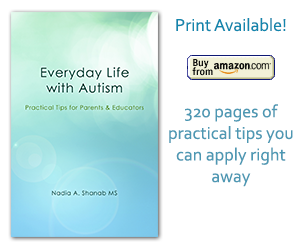By Nadia Shanab | Uncategorized
Asperger’s Syndrome used to be classified as a distinct disorder different from the ASD (Autism Spectrum Disorder). The new (DSM-5) Diagnostic and Statistical Manual of Mental Disorder has simply included the Asperger’s Syndrome within the ASD. By doing this the disorder loses its diagnosis and becomes part of the autism spectrum. A compromise would be
Tags: asperger's syndrome, autism, DSM-5, health, parenting, research, sensory, social interaction, symptoms of autism
Posted in Uncategorized | Comments Off on A Dilemma: Where Does Asperger’s Syndrome Belong?
By Nadia Shanab | Uncategorized
The way ASD (Autism Spectrum Disorders) has always been diagnosed, is based on the professionals’ (pediatrians, psychologists, psychiatirics, specialized therapists…) social interaction with the child. Then, the professional’s opinion supported by parents observations are usually the traditional way to give a child a diagnosis. This novel technology can provide a more accurate, objective, and early
Tags: autism, communication, diagnosis, early intervention, health, parenting, research, sensory, social interaction, speech, symptoms of autism, techniques
Posted in Uncategorized | Comments Off on A New More Accurate Way to Diagnose and Treat Autism
By Nadia Shanab | Uncategorized
One short way to define autism used to be : “A different brain wiring”. The study mentioned below proves that this definition is absoutely correct. A new study reported yesterday (July 22, 2013) by HealthDay News (Serena Gordon) about how the autistic brain is wired. Results of the study were published July 22 online in
Tags: autism, brain wiring, health, parenting, research, symptoms of autism
Posted in Uncategorized | Comments Off on A New Study to Help Define The Biological Basis of Autism
By Nadia Shanab | Uncategorized
Researchers believe that “gentetics” and “environmental” factors are two of the main causes of autism. The exposure to heavy metals -like lead, cadmium, and mercury- is believed to represent one of the environmental threats to the child’s development. A new research published today in ScienceDaily is announcing great news for parents. The research run in Seychellels,
Tags: autism, communication, health, heavy metals, mercury, parenting, research, social interaction, symptoms of autism
Posted in Uncategorized | Comments Off on No Correlation between Prenatal Exposure to Low-Level Mercury and Autistic-Like Behavior
By Nadia Shanab | Uncategorized
The Early Start Denver Model (DSDM) is a comprehensive behavioral program that reduces cost of special education services throughout the schooling years. When joining this program many services and therapies will be reduced. The program is clinically controlled. Social skills and interaction showed great improvement following this program. Even if the first two years in
Tags: autism, communication, early intervention, flexibility, health, occupational therapy, parenting, placement, research, social interaction, speech, symptoms of autism
Posted in Uncategorized | Comments Off on An Early Intervention Program for 12 Months Old Children with ASD
By Nadia Shanab | Uncategorized
The new DSM 5 is due this month (May 2013). It is published by the American Psychiatric Association (APA). Three diagnosis will be removed: Aspergers Syndrome, PDD-NOS, and CDD. They will go under one diagnosis, autism. How is that going to affect parents, cliniacians, educators, advocates, and the children themselves with these conditions? Read the
Tags: asperger's syndrome, autism, communication, diagnosis, health, occupational therapy, parenting, research, symptoms of autism
Posted in Uncategorized | Comments Off on The New Diagnostic and Statistical Manual (DSM 5)
By Nadia Shanab | Uncategorized
According to “Autistica”, 24% of autistic children are non-verbal or minimally verbal. Researchers at the University of Bermingham, UK, supported by “Autistica” found that: 1- The learning of a language is tightly related to motor behaviors (like knocking a toy), and the imitation of facial experssions or gestures. The imitation of gestures and facial expressions
Tags: autism, communication, occupational therapy, parenting, research, social interaction, symptoms of autism, techniques
Posted in Uncategorized | Comments Off on A Hope for Non-Verbal Children
By Nadia Shanab | Uncategorized
Three recent studies show the benefits of an early diagnosis of autism. The new studies confirm what I have mentioned in my article autism-tips.com/?p=1251 based on my experience from working with kids with autism. Scientists can detect brain anomalies as early as six months old. At this young age the brain is still malleable and
Tags: autism, communication, health, occupational therapy, parenting, research, social interaction, symptoms of autism, tips
Posted in Uncategorized | Comments Off on Early Intervention Is A Game-Changer
By Nadia Shanab | Uncategorized
One of the common traits of autism is the inability or having difficulty imitating people. Training children with autism to imitate or copy is very important from an early age. Many children with autism can learn this skill. Learning to imitate improves social skills and enhances communication and human interaction. But How do they imitate?
Tags: autism, communication, parenting, research, symptoms of autism
Posted in Uncategorized | Comments Off on Autistic Kids Can Imitate but Skip The “Silly”
By Nadia Shanab | Uncategorized
Beginning April, Dr. Landa at The Kennedy Krieger Institute is offering a FREE developmental assessments for infants between ages 5 to 10 months who have an older sibling with autism and live within the Mid-Atalntic five-state region (Maryland, Delaware, Pennsylvania, Virginia, West Verginia) or District of Colombia. The risk or likelihood of having a subsequent
Tags: autism, communication, consequences, discipline, flexibility, health, independence, parenting, research, social interaction, symptoms of autism
Posted in Uncategorized | Comments Off on Risk of Autism in Subsequent Siblings

